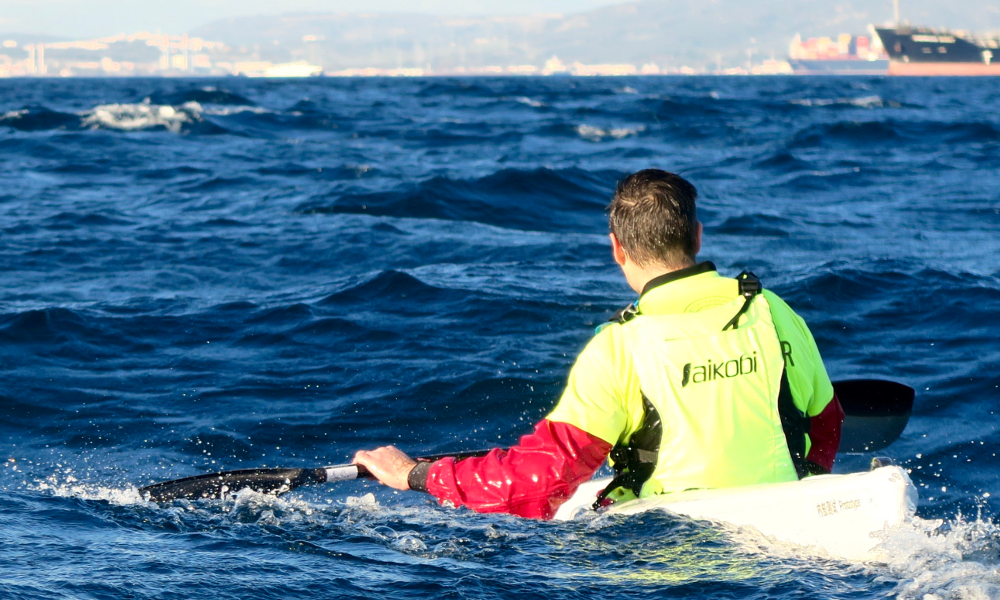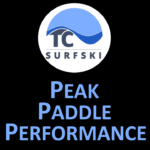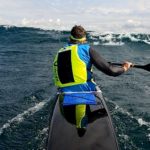Paddling and Philosophizing with Boyan
I recently had a chance to visit Boyan in Tarifa for a short but impactful two days. The easy blog to write is about how awesome it felt to escape the cold gray skies of Northern Michigan in February to catch seemingly endless runs on the sunny Mediterranean with the surf Jedi master himself. All of this was amazing, as was observing Boyan in his element and seeing first hand the level of professionalism and dedication he brings to his students in Tarifa. But as most encounters with Boyan go, the discussion that needs to be documented goes much deeper. Through years of working in the surfski industry, coaching students, consulting with experts outside the industry and generally “thinking outside the box” Boyan sees clearly that the majority of surfski paddlers are intensely focused on racing, continuous improvement, gps statistics, and hull dimensions. While there is nothing inherently wrong with this, Boyan feels that it creates a level of intimidation and misunderstanding of what the sport can be, that makes it less approachable to the masses. He has become an outspoken proponent of letting go of the notion of “Peak Performance” and simply being grateful for the luxury to paddle on the water and surf waves when the opportunity presents. To paraphrase Boyan “the majority of surfski paddlers I see are middle aged with families and demanding careers that by themselves generate enough stress. Why would anyone want to add more stress by setting expectations for their surfski paddling. Rather, getting onto the water should always be a much needed escape from the stresses of modern life.” On one hand, I couldn’t agree more, but wait, I run a podcast titled Peak Paddle Performance where I interview the very best in the world in an effort to extract the tips and tricks to go faster, further, and surf better. I also coincidentally happen to be reading a book titled “Mistakes Were Made (but not by me)” that goes deep into the psychology of confirmation bias, cognitive dissonance, and self justification. So immediately lots of questions start popping up in my mind as I try to perform a brutally honest self assessment and reflection, but also discover if a middle ground can exist where we do seek continuous improvement while at the same time experience nothing but gratitude for every opportunity we get to be on the water.
Questions, Questions, Questions
Is it wrong to aspire to win you’re age group in your local race? Can we drive for improvement but never experience stress? Is it possible not to be attached to results? Is the ego a bad thing? Is the ego a good thing? Am I part of the problem or the solution? Would surfski be a much bigger sport if there wasn’t such a strong competitive origin and high percentage of paddlers who also race? Can surfski become a sport like downhill skiing, scuba diving, traditional surfing, and kite surfing where adults can take up the sport purely for enjoyment with no intentions of ever competing and being measured? I am still pondering most of these questions and I’ll be the first to admit the ego is a tricky one. The spring before I started TC SURFSKI I read Eckhart Tolle’s The Power Of Now. Looking back, I attribute Eckhart’s convincing argument to let go of the ego as a major factor in leading me, a somewhat introverted surfski hack to start a business selling and promoting surfskis. And it is also the the ego roaring back in and creating insecurities that drives me to continue seeking performance results to prove credibility in what I write and say. While I can’t deny a level of subtle competitiveness, my overall disposition is not one of aggressive competitive drive and fortunately that prevents me from experiencing significant stress around training or racing ,and on the whole, paddling serves as much more of a stress relief for me. But when Boyan said that “My wife has a running joke that every time she asks me how a paddle went, I reply it was the best ever”, it made me realize my wife would not respond the same. I still have lots of improvement to make in showing sincere gratitude for every opportunity to get on the water.
A Journey to Mastery
As such a skill intensive sport, surfski does provide an opportunity for someone to start in middle age and enjoy a long, steady, and measurable improvement curve for many years. While we are ultimately in control of our careers and relationships, they are both more complex and often not as black and white. I am convinced there is real happiness and contentment in being on a journey to mastery (as described in George Leonard’s book Mastery), and the surfski presents an amazing opportunity to do this.
Setting the Right Expectations
Maybe the real question comes down to one of setting realistic expectations. Not an easy thing to do in the world of anti-aging where everyone is striving to rewind the clock by at least 20 years. I’m fortunate to have never competed at an elite level and at 43 I’m not yet at the age of serious age handicap at the amateur level. However, I have friends who are, and I know it is a significant struggle as they fight to hold onto an identity forged over years of racing at the top. The prevalence of performance enhancing drugs in the 40+ age groups at amateur races is clear evidence that many middle age athletes have not been able to let go of the ego before things go too far. Not to single out the 40+ crowd, I’m sure it is equally hard for younger athletes just coming out of competing full time, and taking on families and careers and still trying to remain near the top. And while it is easy to think “this would never happen to me” the fascinating science of cognitive dissonance and self justification proves otherwise. A key theme in the book Mistakes Were Made explains how we start at the top of the pyramid and the first few decisions are relatively grey and/or insignificant. But the subtle cognitive dissonance that is created leads to self justification which begins the slippery slope down the pyramid, to the wrong side. On the opposite side of the pyramid is the person who resisted those first grey and seemingly insignificant temptations and also through self justification becomes more and more adamantly opposed to the alternative path.
Back to the questions at hand, where do we go with all of this :
- Peak Paddle Performance Podcast: I will continue to run the podcast as I know many of you have gained immensely from the generous guests I’ve been fortunate to have. But I will also strive to drive a broader dialogue with threads that are more focused on enjoyment and gratitude and less on performance. Perhaps a rebranding of the Podcast, I’m not sure yet, open to thoughts and suggestions from all of you.
- My own paddling: While I know I cannot be 100% unbiased, I do hope my own self awareness is relatively accurate. I love the journey toward mastery of both the forward stroke technique and downwind paddling and I don’t think it causes me undue stress. I would be dishonest if I said I wasn’t hopeful to some day reach a level where I can paddle downwind with the very best. There is ego involved in this goal, but there is also the desire to provide the very best knowledge and experience to others. I am also committed to showing gratitude for each and every opportunity to be on the water and introduce others to this amazing sport.
- You the Racer: This is the demographic that has the biggest challenge. There is nothing wrong with seeking peak performance, but you have to set realistic expectations and ensure it is the journey you enjoy and not the results. For some that may mean no more Strava, or at least going private with it. You have to stay very conscious and aware such that when a session (run, bike, ski, paddle, swim, etc..) introduces stress, you re-evaluate expectations. Along with “Mistakes Were Made” I also highly recommend Daniel Kahneman’s Thinking Fast and Slow which is another fascinating if not terrifying deep dive into how our brain swork. The net of it is that as humans we are far from perfect and much less in control of our thoughts than we like to believe. I would also suggest to read/listen to some of the gurus who teach about the ego. In my experience the teachings are on the far end of the spectrum and while it isn’t likely you’ll end up there, even a small shift on the spectrum is well worth the time and effort.
- You the Newbie: Please know that surfski is not all about racing and hard core extreme adventure. It can and will be exactly what you want it to be. And if that happens to be a casual morning paddle on a small river or lake, that is perfectly okay. Of course I believe strongly that everyone deserves to surf waves, but that doesn’t mean 6 foot swell in 30 knot winds. That could e be 1 1/2 foot waves in 8 knots of wind, which can be every bit as fun.
- The Surfski Industry: There is no doubt that those who want to see growth in the industry need to put themselves in the shoes of the current non-customer who has absolutely no desire to ever race or even measure their time, distance, or heart rate. And in fact may have strong disdain for such things. In the US we continuously struggle to comprehend how hard it is to convert the enormous market of recreational and sea kayakers over to surfski. But we have to take an honest look at the messaging and branding we’re putting out there and how that gets interpreted by these demographics of people. The broad spectrum of possibilities and versatility of the surfski is what makes it such an exciting water craft and industry. We all have to realize that our focus over the past 20 years has been on a very narrow band on one end of the spectrum.
Smiles per minute
With the new facial recognition technology on smart phones, perhaps we aren’t too far off of the new and ultimate metric for surfski paddlers : Smiles per Minute! Someone please develop this one ASAP. My money is on Boyan at the top of the leaderboard… oh wait, no leaderboards 🙂




